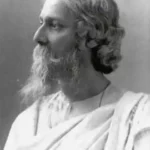 | |
The Son of Rashmani | |
| Author | Rabindranath Tagore |
|---|---|
| Published |
1896
|
| Language | English |
| Original Language | Bengali |
| Nationality | Indian |
| Genre | Bengali Literature, Poetry |
1896 Short Story
The Son of Rashmani
The Son of Rashmani is an English Bengali Literature, Poetry short story by Indian writer Rabindranath Tagore. It was first published in 1896.
The Son of Rashmani
by Rabindranath Tagore
Kalipada’s mother was Rashmani, but she had to do the duty of the father as well, because when both of the parents are “mother” then it is bad for the child. Bhavani, her husband, was wholly incapable of keeping his children under discipline. To know why he was bent on spoiling his son, you must hear something of the former history of the family.
Bhavani was born in the famous house of Saniari. His father, Abhaya Charan, had a son, Shyama Charan, by his first wife. When he married again after her death he had himself passed the marriageable age, and his new father-in-law took advantage of the weakness of his position to have a special portion of his estate settled on his daughter. In this way he was satisfied that proper provision had been made, if his daughter should become a widow early in life. She would be independent of the charity of Shyama Charan.
The first part of his anticipation came true. For very soon after the birth of a son, whom she called Bhavani, Abhaya Charan died. It gave the father-in-law great peace and consolation, as he looked forward to his own death, to know that his daughter was properly looked after.
Shyama Charan was quite grown up. In fact his own eldest boy was a year older than Bhavani. He brought up the latter with his own son. In doing this he never took a farthing from the property allotted to his step-mother, and every year he got a receipt from her after submitting detailed accounts. His honesty in this affair surprised the neighbourhood. In fact they thought that such honesty was another name for foolishness. They did not like the idea of a division being made in the undivided ancestral property. If Shyama Charan in some underhand manner had been able to annul the dowry, his neighbours would have admired his sagacity; and there were good advisers ready to hand who could have rendered him material aid in the attainment of such an object. But Shyama Charan, in spite of the risk of crippling his patrimony, strictly set aside the dowry which came to the share of his step-mother; and the widow, Vraja Sundari, being naturally affectionate and trustful, had every confidence in Shyama Charan whom she trusted as her own son. More than once she had chided him for being so particular about her portion of the property. She would tell him that, as she was not going to take her property with her when she died, and as it would in any case revert to the family, it was not necessary to be so very strict about rendering accounts. But he never listened to her.
Shyama Charan was a severe disciplinarian by habit and his children were perfectly aware of the fact. But Bhavani had every possible freedom, and this gave rise to the impression that he was more partial to his step-brother than to his own sons. But Bhavani’s education was sadly neglected and he completely relied on Shyama Charan for the management of his share of the property. He merely had to sign documents occasionally without ever spending a thought on their contents. On the other hand, Tarapada, the eldest son of Shyama Charan, was quite an expert in the management of the estate, having to act as an assistant to his father.
After the death of Shyama Charan, Tarapada said to Bhavani, “Uncle, we must not live together as we have done for so long, because some trifling misunderstanding may come at any moment and cause utter disruption.”
Bhavani never imagined, even in his dream, that a day might come when he would have to manage his own affairs. The world in which he had been born and bred ever appeared to him complete and entire in itself. It was an incomprehensible calamity to him that there could be a dividing line somewhere and that this world of his could be split into two. When he found that Tarapada was immovable and indifferent to the grief and dishonour that such a step would bring to the family, he began to rack his brain to find out how the property could be divided with the least possible strain.
Tarapada showed surprise at his uncle’s anxiety and said that there was no need to trouble about this, because the division had already been made in the life-time of his grandfather. Bhavani said in amazement, “But I know nothing of this!” Tarapada said in answer, “Then you must be the only one in the whole neighbourhood who does not. For, lest there should be ruinous litigation after he had gone, my grandfather had already given a portion of the property to your mother.” Bhavani thought this not unlikely and asked, “What about the house?” Tarapada said, “If you wish, you can keep this house to yourself and we shall be contented with the other house in the district town.”
As Bhavani had never been to this town-house, he had neither knowledge of it, nor affection for it. He was astounded at the magnanimity of Tarapada for so easily relinquishing his right to the house in the village where they had been brought up. But when Bhavani told everything to his mother, she struck her forehead with her hand and said: “This is preposterous! What I got from my husband was my own dowry and its income is very small. I do not see why you should be deprived of your share in your father’s property.”
Bhavani said, “Tarapada is quite positive that his grandfather never gave us any thing except this land.”
Vraja Sundari was astonished and informed her son that her husband had made two copies of his will, one of which was still lying in her own box. The box was opened and it was found that there was only the deed of gift for the property belonging to the mother and nothing else. The copy of the will had been taken out.
The help of advisers was sought. The man who came to their rescue was Bagala, the son of their family guru. It was the profession of the father to look after the spiritual needs of the village; the material side was left to the son. The two of them had divided between themselves the other world and this. Whatever might be the result for others, they themselves had nothing to suffer from this division. Bagala said that, even if the will was missing, the shares in the ancestral property must be equal, as between the brothers.
Just at this time, a copy of a will made its appearance supporting the claims of the other side. In this document there was no mention of Bhavani and the whole property was given to the grandsons at the time when no son was born to Bhavani. With Bagala as his captain Bhavani set out on his voyage across the perilous sea of litigation. When his vessel at last reached harbour his funds were nearly exhausted and the ancestral property was in the hands of the other party. The land which was given to his mother had dwindled to such an extent, that it could barely give them shelter, or keep up the family dignity. Then Tarapada went away to the district town and they never met again.
Shyama Charan’s treachery pierced the heart of the widow like an assassin’s knife. To the end of her life, almost every day she would heave a sigh and say that God would never suffer such an injustice to be done. She was quite firm in her faith when she said to Bhavani, “I do not know your law or your law courts, but I am certain that my husband’s true will and testament will someday be recovered. You will find it again.”
Because Bhavani was helpless in worldly matters such assurances as these gave him great consolation. He settled down in his inactivity, certain in his own mind that his pious mother’s prophecy could never remain unfulfilled. After his mother’s death his faith became all the stronger, since the memory of her piety acquired greater radiance through death’s mystery. He felt quite unconcerned about the stress of their poverty which became more and more formidable as the years went by. The necessities of life and the maintenance of family traditions,these seemed to him like play acting on a temporary stage, not real things. When his former expensive clothing was outworn and he had to buy cheap materials in the shop, this amused him almost like a joke. He smiled and said to himself,”These people do not know that this is only a passing phase of my fortune. Their surprise will be all the greater, when some day I shall celebrate the Puja Festival with unwonted magnificence.”
This certainty of future prodigality was so clear to his mind’s eye that present penury escaped his attention. His servant, Noto, was the principal companion with whom he had discussions about these things. They used to have animated conversations, in which sometimes his opinion differed from his master’s, as to the propriety of bringing down a theatrical troupe from Calcutta for these future occasions. Noto used to get reprimands from Bhavani for his natural miserliness in these items of future expenditure.
While Bhavani’s one anxiety was about the absence of an heir, who could inherit his vast possible wealth, a son was born to him. The horoscope plainly indicated that the lost property would come back to this boy.
From the time of the birth of his son, Bhavani’s attitude was changed. It became cruelly difficult for him now to bear his poverty with his old amused equanimity, because he felt that he had a duty towards this new representative of the illustrious house of Saniari, who had such a glorious future before him. That the traditional extravagance could not be maintained on the occasion of the birth of his child gave him the keenest sorrow. He felt as if he were cheating his own son. So he compensated his boy with an inordinate amount of spoiling.
Bhavani’s wife, Rashmani, had a different temperament from her husband. She never felt any anxiety about the family traditions of the Chowdhuris of Saniari. Bhavani was quite aware of the fact and indulgently smiled to himself, as though nothing better could be expected from a woman who came from a Vaishnava family of very humble lineage. Rashmani frankly acknowledged that she could not share the family sentiments: what concerned her most was the welfare of her own child.
There was hardly an acquaintance in the neighbourhood with whom Bhavani did not discuss the question of the lost will; but he never spoke a word about it to his wife. Once or twice he had tried, but her perfect unconcern had made him drop the subject. She neither paid attention to the past greatness of the family, nor to its future glories,she kept her mind busy with the actual necessities of the present, and those necessities were not small in number or quality.
When the Goddess of Fortune deserts a house, she usually leaves some of her burdens behind, and this ancient family was still encumbered with its host of dependents, though its own shelter was nearly crumbling to dust. These parasites take it to be an insult if they are asked to do any service. They get head-aches at the least touch of the kitchen smoke. They are visited with sudden rheumatism the moment they are asked to run errands. Therefore all the responsibilities of maintaining the family were laid upon Rashmani herself. Women lose their delicacy of refinement, when they are compelled night and day to haggle with their destiny over things which are pitifully small, and for this they are blamed by those for whom they toil.
Besides her household affairs Rashmani had to keep all the accounts of the little landed property which remained and also to make arrangements for collecting rents. Never before was the estate managed with such strictness. Bhavani had been quite incapable of collecting his dues: Rashmani never made any remission of the least fraction of rent. The tenants, and even her own agents, reviled her behind her back for the meanness of the family from which she came. Even her husband occasionally used to enter his protest against the harsh economy which went against the grain of the world-famed house of Saniari.
Rashmani quite ungrudgingly took the blame of all this upon herself and openly confessed the poverty of her parents. Tying the end of her sari tightly round her waist she went on with her household duties in her own vigorous fashion and made herself thoroughly disagreeable both to the inmates of the house and to her neighbours. But nobody ever had the courage to interfere. Only one thing she carefully avoided. She never asked her husband to help her in any work and she was nervously afraid of his taking up any responsibilities. Indeed she was always furiously engaged in keeping her husband idle; and because he had received the best possible training in this direction she was wholly successful in her mission.
Rashmani had attained middle age before her son came. Up to this time all the pent-up tenderness of the mother in her and all the love of the wife had their centre of devotion in this simple-hearted good-for-nothing husband. Bhavani was a child grown up by mistake beyond its natural age. This was the reason why, after the death of her husband’s mother, she had to assume the position of mother and mistress in one.
In order to protect her husband from invasions of Bagala, the son of the guru, and other calamities, Rashmani adopted such a stern demeanour, that the companions of her husband used to be terribly afraid of her. She never had the opportunity, which a woman usually has, of keeping her fierceness hidden and of softening the keen edge of her words,maintaining a dignified reserve towards men such as is proper for a woman.
Bhavani meekly accepted his wife’s authority with regard to himself, but it became extremely hard for him to obey her when it related to Kalipada, his son. The reason was, that Rashmani never regarded Bhavani’s son from the point of view of Bhavani himself. In her heart she pitied her husband and said, “Poor man, it was no fault of his, but his misfortune, to be born into a rich family.” That is why she never could expect her husband to be deprived of any comfort to which he had been accustomed. Whatever might be the condition of the household finance, she tried hard to keep him in his habitual ease and luxury. Under her régime all expense was strictly limited except in the case of Bhavani. She would never allow him to notice if some inevitable gap occurred in the preparation of his meals or his apparel. She would blame some imaginary dog for spoiling dishes that were never made and would blame herself for her carelessness. She would attack Noto for letting some fictitious article of dress be stolen or lost. This had the usual effect of rousing Bhavani’s sympathy on behalf of his favourite servant and he would take up his defence. Indeed it had often happened that Bhavani had confessed with bare-faced shamelessness that he had used the dress which had never been bought, and for whose loss Noto was blamed; but what happened afterwards, he had not the power to invent and was obliged to rely upon the fertile imagination of his wife who was also the accuser!
Thus Rashmani treated her husband, but she never put her son in the same category. For he was her own child and why should he be allowed to give himself airs? Kalipada had to be content for his breakfast with a few handfuls of puffed rice and some treacle. During the cold weather he had to wrap his body as well as his head with a thick rough cotton chaddar. She would call his teacher before her and warn him never to spare her boy, if he was the least neglectful with his lessons. This treatment of his own son was the hardest blow that Bhavani Charan suffered since the days of his destitution. But as he had always acknowledged defeat at the hands of the powerful, he had not the spirit to stand up against his wife in her method of dealing with the boy.
The dress which Rashmani provided for her son, during the Puja festivities, was made of such poor material that in former days the very servants of the house would have rebelled if it had been offered to them. But Rashmani more than once tried her best to explain to her husband that Kalipada, being the most recent addition to the Chowdhuri family, had never known their former splendour and so was quite glad to get what was given to him. But this pathetic innocence of the boy about his own destiny hurt Bhavani more than anything else, and he could not forgive himself for deceiving the child. When Kalipada would dance for joy and rush to him to show him some present from his mother, which was ridiculously trivial, Bhavani’s heart would suffer torture.
Bagala, the guru’s son, was now in an affluent condition owing to his agency in the law suit which had brought about the ruin of Bhavani. With the money which he had in hand he used to buy cheap tinsel wares from Calcutta before the Puja holidays. Invisible ink,absurd combinations of stick, fishing-rod and umbrella,letter-paper with pictures in the corner,silk fabrics bought at auctions, and other things of this kind, attractive to the simple villagers,these were his stock in trade. All the forward young men of the village vied with one another in rising above their rusticity by purchasing these sweepings of the Calcutta market which, they were told, were absolutely necessary for the city gentry.
Once Bagala had bought a wonderful toy,a doll in the form of a foreign woman,which, when wound up, would rise from her chair and begin to fan herself with sudden alacrity. Kalipada was fascinated by it. He had a very good reason to avoid asking his mother about the toy; so he went straight to his father and begged him to purchase it for him. Bhavani answered “yes” at once, but when he heard the price his face fell. Rashmani kept all the money and he went to her as a timid beggar. He began with all sorts of irrelevant remarks and then took a desperate plunge into the subject with startling incoherence.
Rashmani briefly remarked: “Are you mad?” Bhavani Charan sat silent revolving in his mind what to say next.
“Look here,” he exclaimed, “I don’t think I need milk pudding daily with my dinner.”
“Who told you?” said Rashmani sharply.
“The doctor says it’s very bad for biliousness.”
“The doctor’s a fool!”
“But I’m sure that rice agrees with me better than your luchis. They are too indigestible.”
“I’ve never seen the least sign of indigestion in you. You have been accustomed to them all your life!”
Bhavani Charan was ready enough to make sacrifices, but there his passage was barred. Butter might rise in price, but the number of his luchis never diminished. Milk was quite enough for him at his midday meal, but curds also had to be supplied because that was the family tradition. Rashmani could not have borne seeing him sit down to his meal, if curds were not supplied. Therefore all his attempts to make a breach in his daily provisions, through which the fanning foreign woman might enter, were an utter failure.
Then Bhavani paid a visit to Bagala for no reason whatever, and after a great deal of round about talk asked concerning the foreign doll. Of course his straightened circumstances had long been known to Bagala, yet it was a perfect misery to Bhavani to have to hesitate to buy this doll for his son owing to want of ready money. Swallowing his pride, he brought out from under his arm an expensive old Kashmir shawl, and said in a husky voice: “My circumstances are bad just at present and I haven’t got much cash. So I have determined to mortgage this shawl and buy that doll for Kalipada.”
If the object offered had been less expensive than this Kashmir shawl, Bagala would at once have closed the bargain. But knowing that it would not be possible for him to take possession of this shawl in face of the village opinion, and still more in face of Rashmani’s watchfulness, he refused to accept it; and Bhavani had to go back home disappointed with the Kashmir shawl hidden under his arm.
Kalipada asked every day for that foreign fanning toy, and Bhavani smiled every day and said,”Wait, a bit, my boy, till the seventh day of the moon comes round.” But every new day it became more and more difficult to keep up that smile.
On the fourth day of the moon Bhavani made a sudden inroad upon his wife and said:
“I’ve noticed that there’s something wrong with Kalipada,something the matter with his health.”
“Nonsense,” said Rashmani, “he’s in the best of health.”
“Haven’t you noticed him sitting silent for hours together?”
“I should be very greatly relieved if he could sit still for as many minutes.”
When all his arrows had missed their mark, and no impression had been made, Bhavani Charan heaved a deep sigh and passing his fingers through his hair went away and sat down on the verandah and began to smoke with fearful assiduity.
On the fifth day, at his morning meal, Bhavani passed by the curds and the milk pudding without touching them. In the evening he simply took one single piece of sandesh. The luchis were left unheeded. He complained of want of appetite. This time a considerable breach was made in the fortifications.
On the sixth day, Rashmani took Kalipada into the room and sweetly calling him by his pet name said, “Betu, you are old enough to know that it is the halfway house to stealing to desire that which you can’t have.”
Kalipada whimpered and said, “What do I know about it? Father promised to give me that doll.”
Rashmani sat down to explain to him how much lay behind his father’s promise,how much pain, how much affection, how much loss and privation. Rashmani had never in her life before talked thus to Kalipada, because it was her habit to give short and sharp commands. It filled the boy with amazement when he found his mother coaxing him and explaining things at such a length, and mere child though he was, he could fathom something of the deep suffering of his mother’s heart. Yet at the same time it will be easily understood, that it was hard for this boy to turn his mind away altogether from that captivating foreign fanning woman. He pulled a long face and began to scratch the ground.
This made Rashmani’s heart at once hard, and she said in her severe tone: “Yes, you may weep and cry, or become angry, but you shall never get that which is not for you to have.” And she hastened away without another word.
Kalipada went out. Bhavani Charan was still smoking his hookah. Noticing Kalipada from a distance he got up and walked in the opposite direction as if he had some urgent business. Kalipada ran to him and said,”But that doll?” Bhavani could not raise a smile that day. He put his arm round Kalipada’s neck and said:
“Baba, wait a little. I have some pressing business to get through. Let me finish it first, and then we will talk about it.” Saying this, he went out of his house.
Kalipada saw him brush a tear from his eyes. He stood at the door and watched his father, and it was quite evident, even to this boy, that he was going nowhere in particular, and that he was dragging the weight of a despair which could not be relieved.
Kalipada at once went back to his mother and said:
“Mother, I don’t want that foreign doll.”
That morning Bhavani Charan returned late. When he sat down to his meal, after his bath, it was quite evident, by the look on his face, that the curds and the milk pudding would fare no better with him than on the day before, and that the best part of the fish would go to the cat.
Just at this critical juncture Rashmani brought in a card-board box, bound round with twine, and set it before her husband. Her intention had been to reveal the mystery of this packet to her husband when he went to take his nap after his meal. But in order to remove the undeserved neglect of the curds and the milk and the fish, she had to disclose its contents before the time. So the foreign doll came out of the box and without more ado began to fan itself vigorously.
After this, the cat had to go away disappointed. Bhavani remarked to his wife that the cooking was the best he had ever tasted. The fish soup was incomparable: the curds had set themselves with an exactness that was rarely attained, and the milk pudding was superb.
On the seventh day of the moon, Kalipada got the toy for which he had been pining. During the whole of that day he allowed the foreigner to go on fanning herself and thereby made his boy companions jealous. In any other case this performance would have seemed to him monotonously tiresome, but knowing that on the following day he would have to give the toy back, his constancy to it on that single occasion remained unabated. At the rental of two rupees per diem Rashmani had hired it from Bagala.
On the eighth day of the moon, Kalipada heaved a deep sigh and returned the toy, along with the box and twine, to Bagala with his own hands. From that day forward Kalipada began to share the confidences of his mother, and it became so absurdly easy for Bhavani to give expensive presents every year, that it surprised even himself.
When, with the help of his mother, Kalipada came to know that nothing in this world could be gained without paying for it with the inevitable price of suffering, he rapidly grew up in his mind and became a valued assistant to his mother in her daily tasks. It come to be a natural rule of life with him that no one should add to the burden of the world, but that each should try to lighten it.
When Kalipada won a scholarship at the Vernacular examination, Bhavani proposed that he should give up his studies and take in hand the supervision of the estate. Kalipada went to his mother and said,”I shall never be a man, if I do not complete my education.”
The mother said,”You are right, Baba, you must go to Calcutta.”
Kalipada explained to her that it would not be necessary to spend a single pice on him; his scholarship would be sufficient, and he would try to get some work to supplement it.
But it was necessary to convince Bhavani of the wisdom of the course. Rashmani did not wish to employ the argument that there was very little of the estate remaining to require supervision; for she knew how it would hurt him. She said that Kalipada must become a man whom everyone could respect. But all the members of the Chowdhuri family had attained their respectability without ever going a step outside the limits of Saniari. The outer world was as unknown to them as the world beyond the grave. Bhavani, therefore, could not conceive how anybody could think of a boy like Kalipada going to Calcutta. But the cleverest man in the village, Bagala, fortunately agreed with Rashmani.
“It is perfectly clear,” he said, “that, one day, Kalipada will become a lawyer; and then he will set matters right concerning the property of which the family has been deprived.”
This was a great consolation to Bhavani Charan and he brought out the file of records about the theft of the will and tried to explain the whole thing to Kalipada by dint of daily discussion. But his son was lacking in proper enthusiasm and merely echoed his father’s sentiment about this solemn wrong.
The day before Kalipada’s departure for Calcutta Rashmani hung round his neck an amulet containing some mantras to protect him from evils. She gave him at the same time a fifty-rupee currency note, advising him to keep it for any special emergency. This note, which was the symbol of his mother’s numberless daily acts of self-denial, was the truest amulet of all for Kalipada. He determined to keep it by him and never to spend it, whatever might happen.
From this time onward the old interminable discussions about the theft of the will became less frequent on the part of Bhavani. His one topic of conversation was the marvellous adventure of Kalipada in search of his education. Kalipada was actually engaged in his studies in the city of Calcutta! Kalipada knew Calcutta as well as the palm of his hand! Kalipada had been the first to hear the great news that another bridge was going to be built over the Ganges near Hughli! The day on which the father received his son’s letter, he would go to every house in the village to read it to his neighbours and he would hardly find time even to take his spectacles from his nose. On arriving at a fresh house he would remove them from their case with the utmost deliberation; then he would wipe them carefully with the end of his dhoti; then, word by word, he would slowly read the letter through to one neighbour after another, with something like the following comment:
“Brother, just listen! What is the world coming to? Even the dogs and the jackals are to cross the holy Ganges without washing the dust from their feet! Who could imagine such a sacrilege?”
No doubt it was very deplorable; but all the same it gave Bhavani Charan a peculiar pleasure to communicate at first hand such important news from his own son’s letter, and this more than compensated for the spiritual disaster which must surely overtake the numberless creatures of this present age. To everyone he met he solemnly nodded his head and prophesied that the days were soon coming when Mother Ganges would disappear altogether; all the while cherishing the hope that the news of such a momentous event would come to him by letter from his own son in the proper time.
Kalipada, with very great difficulty, scraped together just enough money to pay his expenses till he passed his Matriculation and again won a scholarship. Bhavani at once made up his mind to invite all the village to a feast, for he imagined that his son’s good ship of fortune had now reached its haven and there would be no more occasion for economy. But he received no encouragement from Rashmani.
Kalipada was fortunate enough to secure a place of study in a students’ lodging house near his college. The proprietor allowed him to occupy a small room on the ground floor which was absolutely useless for other lodgers. In exchange for this and his board, he had to coach the son of the owner of the house. The one great advantage was that there would be no chance of any fellow lodger ever sharing his quarters. So, although ventilation was lacking, his studies were uninterrupted.
Those of the students who paid their rent and lived in the upper story had no concern with Kalipada; but soon it became painfully evident that those who are up above have the power to hurl missiles at those below with all the more deadly force because of their distance. The leader of those above was Sailen.
Sailen was the scion of a rich family. It was unnecessary for him to live in a students’ mess, but he successfully convinced his guardians that this would be best for his studies. The real reason was that Sailen was naturally fond of company, and the students’ lodging house was an ideal place where he could have all the pleasure of companionship without any of its responsibilities. It was the firm conviction of Sailen that he was a good fellow and a man of feeling. The advantage of harbouring such a conviction was that it needed no proof in practice. Vanity is not like a horse or an elephant requiring expensive fodder.
Nevertheless, as Sailen had plenty of money he did not allow his vanity merely to graze at large; he took special pride in keeping it stall-fed. It must be said to his credit that he had a genuine desire to help people in their need, but the desire in him was of such a character, that if a man in difficulty refused to come to him for help, he would turn round on him and do his best to add to his trouble. His mess mates had their tickets for the theatre bought for them by Sailen, and it cost them nothing to have occasional feasts. They could borrow money from him without meaning to pay it back. When a newly married youth was in doubt about the choice of some gift for his wife, he could fully rely on Sailen’s good taste in the matter. On these occasions the love-lorn youth would take Sailen to the shop and pretend to select the cheapest and least suitable presents: then Sailen, with a contemptuous laugh would intervene and select the right thing. At the mention of the price the young husband would pull a long face, but Sailen would always be ready to abide by his own superior choice and to pay the cost.
In this manner Sailen became the acknowledged patron of the students upstairs. It made him intolerant of the insolence of any one who refused to accept his help. Indeed, to help others in this way had become his hobby.
Kalipada, in his tattered jersey, used to sit on a dirty mat in his damp room bel







